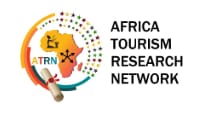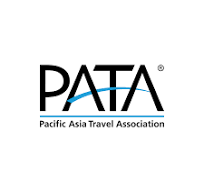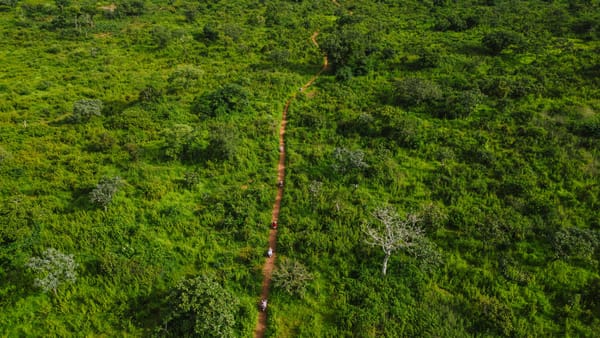Meaningful Tourism – A global concept accelerating pace to slow down the end of tourism
EDITORIAL
Dear reader,
spending more than 30 hours on aircrafts in the last 20 days to be part of four conferences and about 50 face-to-face meetings with partners, colleagues and old and new Meaningful Tourism trainers, the need to speed up the introduction of SAF instead of currently used fossil fuels became again apparent to your humble editor. There is no other way to cover a route like Kathmandu-Bangkok-Hong Kong-Istanbul-Germany-Kathmandu other than by aircraft. In Germany Frankfurt-Munich-Frankfurt-Berlin was done by ICE highspeed train of course, surprisingly with trains on time for all three trips.
As reported in our SPECIAL EDITION Open Post Editor last week, Meaningful Tourism has been adopted as the Vision of the PATA Pacific Asia Travel Association, a big step forward to accelerate the dissemination of this paradigm and practical tool to help destinations and companies to survive economically through a holistic approach and adaptation to the changes in demand, technology and climate. The negative effects of Climate Change and Loss of Biodiversity will increase in the coming decades, whatever we do from tomorrow, however, it is still necessary to fight for at least a slowdown.
On May 20th, 2025, MTC Meaningful Tourism Centre will organise a Webinar, which will include the latest developments and insights also from the Meaningful Tourism conferences and presentations in Istanbul and in Berlin in April as well as in Guangzhou in May. Please mark the date already in your agenda. The Webinar will start at 9 am GMT (11 am European Summer Time, 12 noon Nairobi, 2:45 pm Kathmandu, 4 pm Bangkok, 5 pm Hong Kong).
“Good tourism” is a insightful blog, which kindly published short texts of your humble editor in the past and also in the last edition. Open Post Editor Sustainability Fatigue in Tourism
A shortened version reads like this: "Open LinkedIn and social media, and you’ll find countless posts: “If only tourists would understand sustainability,” or “Travellers are learning!”, believing this solves climate change and overtourism. Wishing for a better world is noble, but as effective as writing to Santa or burning incense. Many are tired of “green” talk without seeing positive impact, despite eating less meat, cycling, and taking trains.
We must communicate that all efforts are vital, but our goal is to delay tipping points like the collapse of the Atlantic Meridional Overturning Circulation (AMOC) or permafrost thaw. This concept mirrors medicine, where we work hard to extend life, knowing very well that death is inevitable. Living for 80 or 90 years instead of 30 or 40 is valued, as it should be with the lifespan of homo sapiens on the planet.
On the other hand, ‘Wishwashing’ — telling people small actions will fix everything — leads to ‘sustainability fatigue’. We must push for sustainable aviation fuel and a circular economy, but with the clearly communicated goal of prolonging humanity’s existence, knowing the point of no return is likely past. We fight to delay, not prevent, our eventual fate following the dinosaurs into oblivion."
The Meaningful Tourism Weekly team is very happy to see the increasing number of readers and subscribers. If you like the content, please invite your friends and colleagues to subscribe as well – our publication will continue to be free of charge and without advertisements.
To learn more about Meaningful Tourism and how it can support your destination, company and organisation, we recommend the Meaningful Tourism Transformational Game Workshop. Happy to provide more information.
All best wishes from your humble editor Prof. Dr. Wolfgang Georg Arlt and the whole Meaningful Tourism Centre team!

Editor: Prof. Dr. Wolfgang Georg Arlt
Guest Article
People, Places, Purpose: The Community Homestay Network’s Journey of Community Tourism
By Aayusha Prasain | CEO, Community Homestay Network (CHN)
When done right; by placing people, places, and purpose at its core; travel has the potential to become a powerful force for good. Over the past few years, I’ve had the privilege of witnessing this transformation firsthand through my journey with the Community Homestay Network (CHN).
From this vantage point, I can confidently say that community tourism is far more than a trend or buzzword. When communities are not just included but are the ones leading and telling their stories, tourism becomes a vehicle for meaningful change.
We have been fortunate to build strong partnerships and receive support from a wide spectrum of stakeholders, local communities, development partners, government bodies, and tourism professionals. We are deeply grateful for the opportunity to collaborate closely with community members across Nepal. Their leadership and lived experiences have shaped what community tourism truly stands for, and continue to define how it should evolve: inclusive, grounded, and led by the very people it represents.
Where It All Began
CHN’s journey began humbly in 2012 with a single homestay in Panauti, a beautiful, culturally rich town just a short drive from Kathmandu. What started as a small initiative quickly grew into something much larger. It was never just about offering a place to sleep; it was about opening doors, both literally and figuratively, to local traditions, heritage, and untold stories.
Today, we are proud to collaborate with over 40 community homestays across Nepal, each with its own vibrant identity and unique narrative. With over a decade of experience, CHN continues to advocate for community-based tourism, working hand-in-hand with local communities, tourism stakeholders, and travelers to amplify authentic voices and shared experiences.
At its heart, community tourism aims to shift the narrative of travel, moving beyond surface-level sightseeing to reveal the true essence of a destination through its culture, people, and daily life. It celebrates the richness, resilience, and humanity that define these regions. The power of travel lies in its ability to shift perspectives and deepen our understanding of the world, and that truth fuels everything we do at CHN.
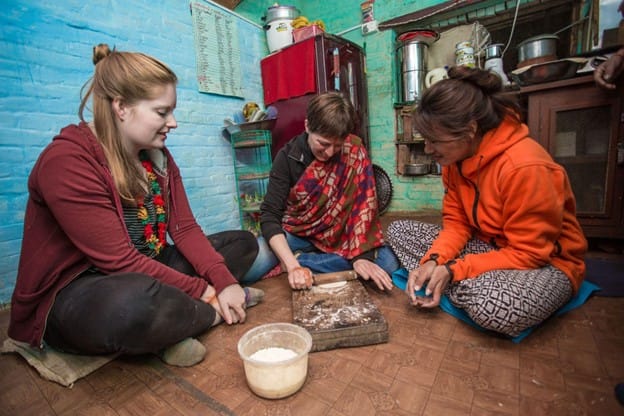
What We Strive For
When travelers stay with host families in our network, they’re not just guests; they become part of something deeper, even if just for a few days. They wake up to the sound of roosters, sip morning tea with host families, enjoy home-cooked meals over shared laughter, try their hand at weaving or making momos, and often find themselves dancing to the rhythm of local beats.
At CHN, we work hand in hand with our community partners to co-create experiences grounded in respect, reciprocity, and realism. Our product development team collaborates closely with local champions; hosts, artisans, elders, and youth, to ensure tourism is empowering rather than extractive.
And then there’s our sales and marketing team, who pour belief, determination, and a bit of everyday magic into amplifying these experiences, sharing the stories we've co-created with communities and helping them reach travelers who seek connection, authenticity, and purpose in their journeys.
We believe, wholeheartedly, that community tourism is not just for niche travelers. It holds the power to reshape the entire industry.
But with that power comes responsibility.
Tourism influences how people see a country. For many travelers, what they experience during their visit becomes the main lens through which they understand Nepal. Too often, that lens is skewed. Nepal is either portrayed as a country in need of saving or idealized as a “poor but happy” land. This is where community tourism steps in. It invites travelers to go beyond the postcard version of a place. It asks them to truly engage. And it calls on us, as tourism facilitators, to ensure that the experiences we help create are honest, respectful, and led by the communities themselves.
A perfect example of this is the Ranjana Lipi and Aila Workshop in Kirtipur. This wasn’t something we came up with just in an office. We collaborated on this entire workshop with the people of Kirtipur Community Homestay. Ranjana Lipi, the ancient script of Nepal Bhasa (Newar language), is more than beautiful writing. It represents history, identity, and pride. The Kirtipur community wanted to share this living tradition, not just as something to observe, but as something guests could learn and connect with.
From there, the collaboration began. We worked closely with the chairperson of the Kirtipur Community Homestay and two incredible experts, Gyan Bahadur Maharjan and Buddhilal Maharjan. Together, we created a workshop experience that brings Ranjana Lipi to life, right in the community. Guests get to learn the script and enjoy Aila, the traditional Newari rice liquor, in the very place where these customs and their story of resilience to keep the script alive are part of daily life.
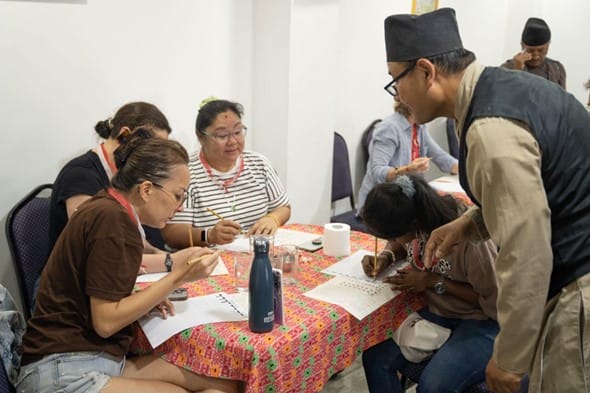
That’s what true community tourism looks like. It takes time, patience, and partnership. But when done right, it becomes a celebration of place, people, and shared experiences.
And that’s the kind of tourism we’ll keep building, one story, one community, one journey at a time.
Women at the Heart of It All
One of the most rewarding parts of our work at CHN is witnessing women step confidently into leadership roles through tourism. Many of our homestays are led by women who, through the simple yet powerful act of hosting, gain not just income, but also confidence, independence, and a renewed sense of identity.
At CHN, we’re intentional about creating these pathways. We prioritize building the capacity of our women hosts by offering training in hospitality, product development, communication among many others. From context-aware training to decision-making roles and financial autonomy, we’re committed to driving real, lasting change.
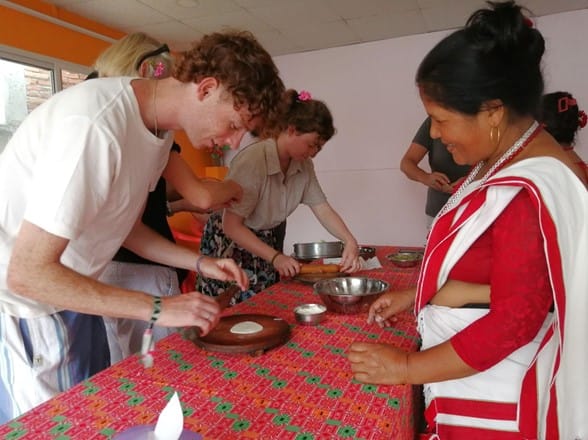
As a social enterprise dedicated to empowering women through community tourism, CHN provides more than just a livelihood, it creates space for women to lead, grow, and thrive. Our approach offers a ‘soft launch’ into the workforce in a society where patriarchal norms still limit women’s economic participation. It helps safeguard cultural traditions while sparking ripple effects across generations, building stronger support networks and ensuring that women’s voices are central in shaping Nepal’s tourism landscape.
Rethinking the Way We Travel
As a team, we constantly ask ourselves: What does responsible tourism actually look like on the ground? For us, it means diverting attention from over-touristed areas to lesser-known gems, villages like Bhada, Narchyang, and Dhankuta, where tourism can play a real role in community development.
It also means being intentional about climate-conscious practices, from encouraging plastic reduction to supporting local food systems and architecture. We see tourism not as an end in itself, but as a tool for sustainable development, safeguarding of the culture, and resilience building. None of this would be possible without collaboration. We don’t work for communities, we work with them. Every product we offer, from cooking classes to guided walks and arts and crafts workshops, is designed through a consultative process. Our job as facilitators is to ensure that the community’s voice leads the way.
Whether it’s through our partnerships with like-minded organizations like Planeterra, ICIMOD, or activities under USAID in the past year, or our own internal strategic meetings, our team is always learning, adapting, and growing. Together, we’re not just building experiences, we are building ecosystems.
Recognition and Reflections
In 2025, CHN was honored to be featured in TIME Magazine’s list of the World’s Greatest Places. While recognition like this is encouraging, what means more to me is seeing travelers widening their horizon about Nepal, hearing hosts say things like, “We never imagined people from across the world would come to our homes and value our way of life.” These moments are the quiet proof that this model works; that tourism can be deeply meaningful, for both visitor and host. The journey is far from over. As we look to the future, our focus remains on deepening impact rather than just expanding numbers. We want to continue co-creating authentic, inclusive, and community-led experiences that uplift local economies and honor cultural identities.
As one of our hosts from Panauti once told me, “Hosting guests has not only given us income but allowed us to share who we are. It's a two-way exchange that stays in the heart.”
If you're a traveler seeking more than just sightseeing, if you want to truly connect with the soul of a place, we invite you to explore Nepal through the eyes and stories of its people.
Follow our journey on LinkedIn or visit communityhomestay.com to learn more.
Meet the Trainers for the Meaningful Tourism Transformative Game Workshop:

Mandulo Septi Bukula
Mandulo Septi Bukula, a visionary leader from South Africa, has over three decades of experience in entrepreneurship policy, SME development, and tourism innovation.
Mr. Bukula holds a Master of Philosophy (Social Science Methods) from the University of Stellenbosch. His research explored methodological issues in evaluating small and medium enterprise development programmes, setting the stage for a career rooted in evidence-based policymaking.
Since 1993, he has advised government departments, international agencies, and private sector partners on public policy and regulatory reform.
His work includes landmark projects for the World Bank in Kenya and Rwanda, and pivotal SME policy reviews in South Africa.
Mr. Bukula is also the founder of Seeza Tourism Growth Network (now Rendzo Network), which connects tourism SMEs to global markets.
His achievements have earned him honors such as Honorary Life Member of IBASA and Business Events Ambassador for South Africa.
Meaningful Tourism Weekly asked Septi about the situation of tourism in South Africa and the role Meaningful Tourism paradigm can play to support the development in this country.
His answer:
Tourism in South Africa is experiencing a dynamic phase of recovery and growth. Following the challenges posed by the global pandemic, the sector has shown resilience, with international arrivals improving, albeit still below the country’s peak performance back in 2017, before the global pandemic. One of the key challenges faced by the local tourism sector as a whole is the persistence of uneven distribution of tourism benefits across the country, with small towns and villages especially affected by this exclusion.
The Meaningful Tourism paradigm offers a transformative approach to addressing this and other challenges. By emphasizing sustainability, inclusivity, and community engagement, this paradigm aligns with South Africa's goals of promoting ethical and equitable tourism practices. For instance, initiatives prioritizing rural and under-explored destinations can help distribute tourism income more equitably while preserving cultural heritage.
Moreover, the paradigm encourages collaboration between stakeholders to create tailored experiences that resonate with diverse traveller interests, which strongly resonates with South Africa’s emphasis on continuous product development and enhancement. By fostering partnerships and investing in community-based tourism models, South Africa can build a resilient and globally competitive tourism sector. In conclusion, the Meaningful Tourism paradigm not only addresses the current challenges but also paves the way for a sustainable and inclusive future for South Africa's tourism industry.
Trainers Around the World
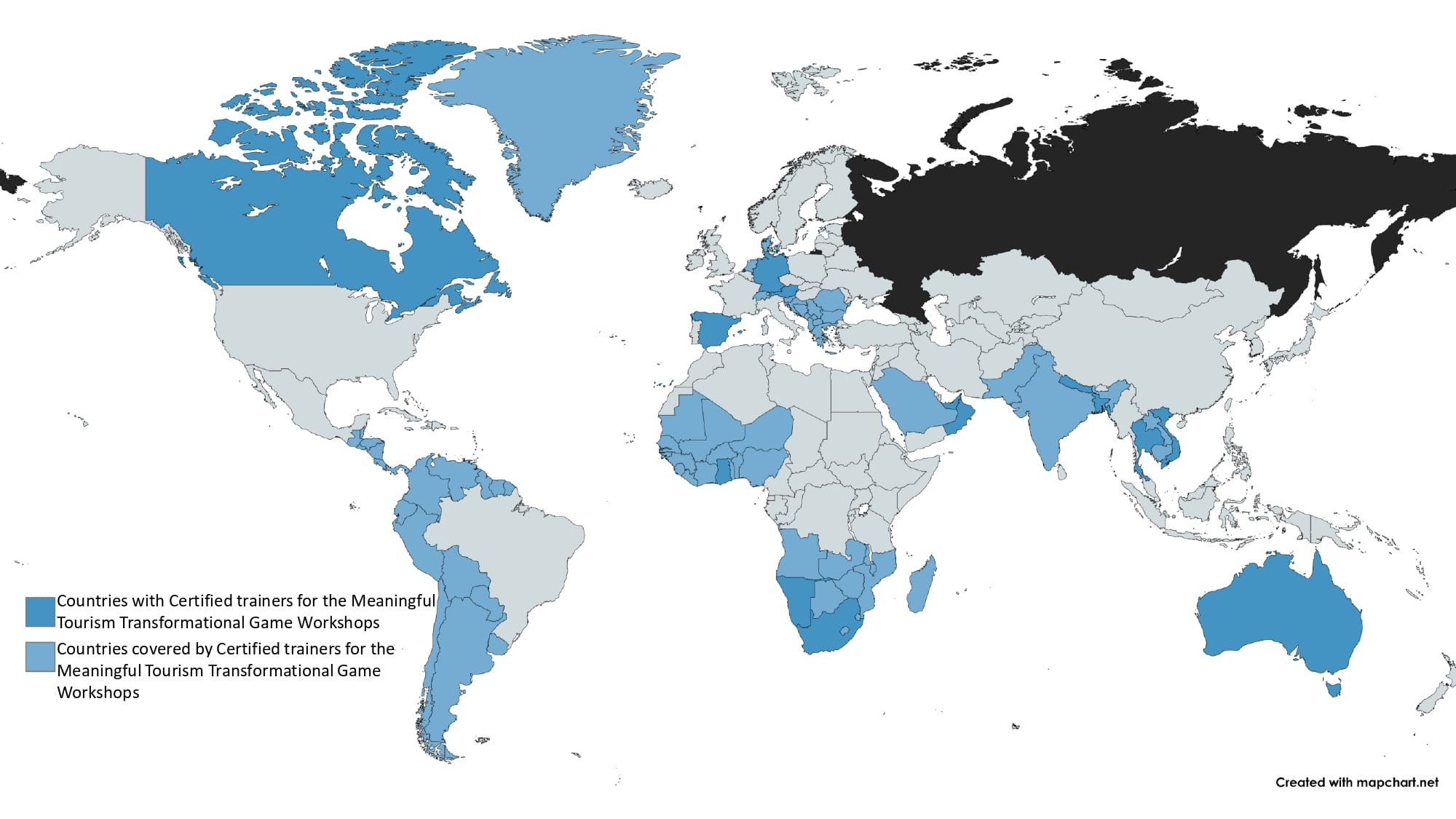
MTC is happy to invite more persons to become certified trainers and offering Meaningful Tourism Transformational Game Workshops in countries or regions not yet covered. If you have experience as a trainer and interest to support sustainable tourism, please contact us.
Meaningful Tourism Best Practice Example
Sustainable Travel And Tourism Agenda Empowering Local Communities
The Challenge: Barriers to Sustainable Growth
Sustainable Travel and Tourism Agenda (STTA), based in Nairobi, Kenya, has long recognized the challenges faced by tourism businesses and communities, particularly Medium, Small & Micro Enterprises (MSMEs). These businesses encounter significant hurdles — from limited access to markets and resources to the lack of sustainability knowledge — preventing them from fully integrating into the tourism supply chain. Similarly, community and group conservancies in Kenya have struggled to balance conservation, social justice, and development objectives, threatening both livelihoods and the protection of natural assets.
The Solution: Building Capacity and Empowering Communities
To address these issues, STTA has pioneered tailored solutions that enable and empower tourism stakeholders. Through specialized programs, training, coaching, research, and technical assistance, STTA builds capacity in sustainable tourism practices. STTA supports businesses by:
- Sustainable Tourism Host Communities Project Management
- Sustainable Tourism Training and Coaching
- Community-Centered Tourism Research
- Youth Mentorship Programs
- Business Development Services for MSMEs
- Policy and Strategy Review
- Sustainability Assessments and Benchmarking
- Community Tourism Development
- Community Conservation Initiatives


Innovative initiatives like community conservation readiness programs, partnerships with organizations like CBI Netherlands and Airbnb, and targeted training for tourism players have equipped communities and tourism businesses with the skills and tools necessary for resilience, competitiveness, and growth. STTA’s unique governance models, sustainability assessments, and business development services have created a strong foundation for integrating sustainability into core operations.

The Result: Transforming Tourism for Sustainable Impact
The results speak for themselves: over 15 community conservancies in the Masai Mara region have experienced significant stability, growth, and maturity through STTA’s guidance. By strengthening governance, fostering community engagement, and promoting sustainable tourism practices, STTA has not only helped protect Kenya’s treasured natural and cultural assets but has also opened new economic opportunities for local communities. Through collaboration, innovation, and practical support, STTA continues to turn tourism challenges into powerful catalysts for sustainable development.
Meaningful Tourism News
For more information on the latest Meaningful Tourism news, we recommend looking at the following information from our partners and colleagues:
TRAVELLERS
Tourists increasingly conscious about impact on environment and local communities
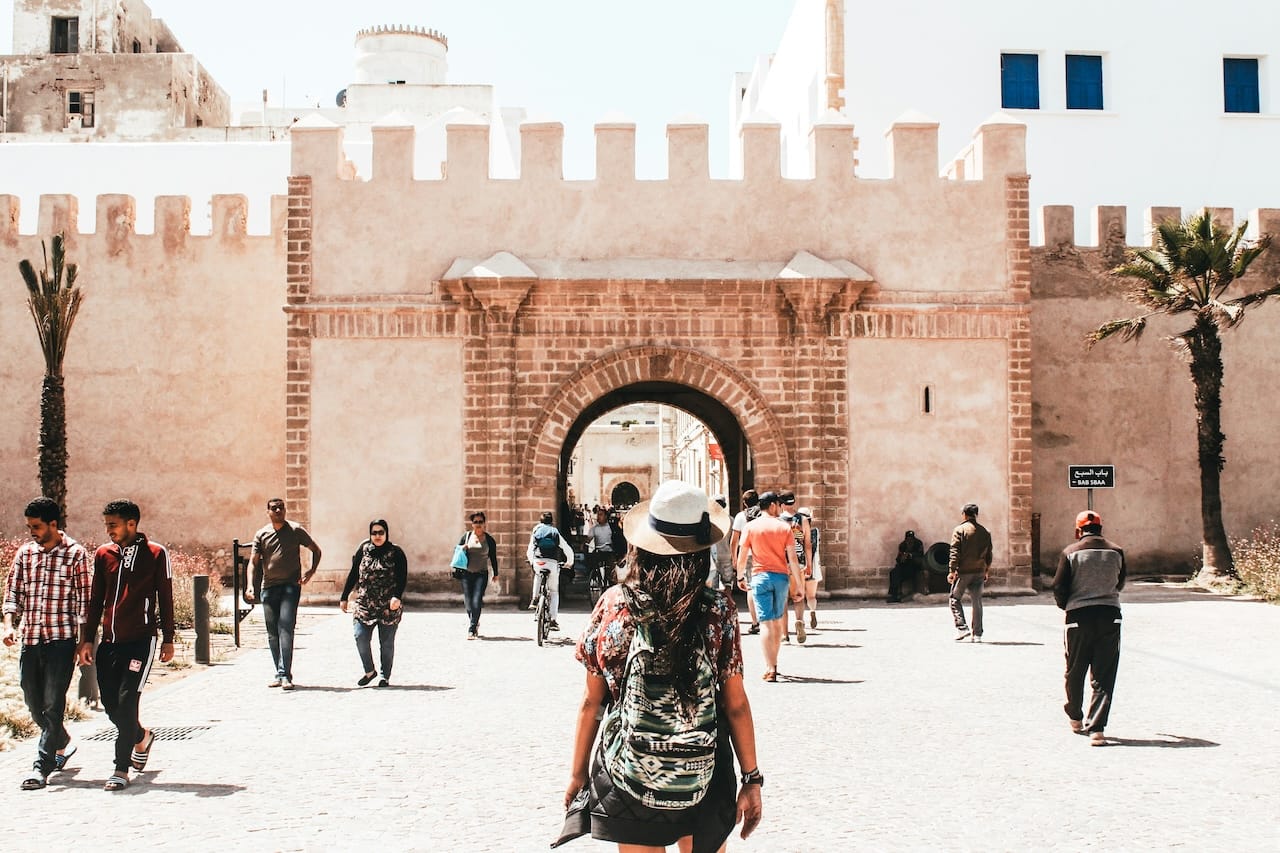
Sustainability is a hot topic in 2025 and the tourism industry is not an exception. A new survey by Booking.com shows how travellers are redefining their understanding of sustainable practices, growing evermore conscious of how their behaviour impacts local communities and the environment.
Tourists increasingly conscious about impact on environment and local communities
HOST COMMUNITIES
Citizens Demand Action to Save Old Goa from Illegal Construction and Neglect

PANJIM: Citizens for Democracy Goa on Monday called for urgent and decisive action to protect Old Goa, a UNESCO World Heritage Site, from the increasing threat posed by illegal construction and poor regulatory enforcement.
Safeguard Old Goa: Stop Illegal Constructions – Herald Goa
EMPLOYEES
The hidden costs of emotional labor for hotel employees

Guests expect excellent, personalized, and memorable service and experiences, which involves emotional labor—the process of managing emotions to align with workplace expectations.
We all know that working in a hotel or spa requires more than just simple guest interactions and meeting basic job requirements, particularly when it comes to luxury and award-winning properties.
The Hidden Costs of Emotional Labor for Hotel Employees
COMPANIES
AirAsia Philippines Spotlights Responsible and Purposeful Travels at Love Boracay 2025
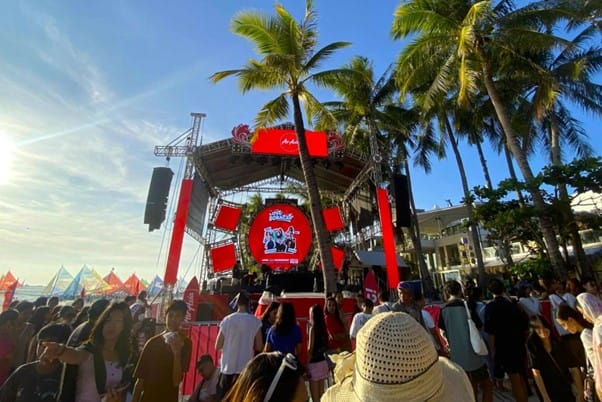
As the official airline partner of LOVE BORACAY 2025, AirAsia is shining a spotlight on the importance of accessibility, representation, and equal opportunities in tourism. Through initiatives like barrier-free adventures and collaborations with local partners and communities, AirAsia ensures you fly safely with peace of mind, and empowers you to fully enjoy the offerings of the island destination.
GOVERNMENTS
UN Tourism and WTA identify ways to make sector key driver of inclusive development
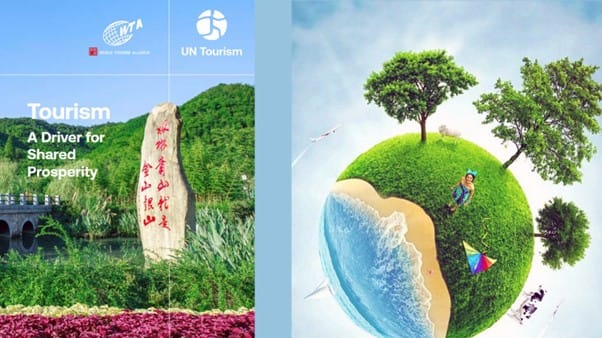
A new report by UN Tourism and the World Tourism Alliance (WTA) highlights that targeted policies, regulatory frameworks and governance models are crucial to ensuring tourism benefits are shared by all community members, promoting social equity and inclusion. The report makes clear the multifaceted role of tourism in achieving this objective, through job creation, gender empowerment, community development, natural and cultural heritage conservation, sustainable environmental practices, education and infrastructure development.
ENVIRONMENT
African Tourism Tackles Waste
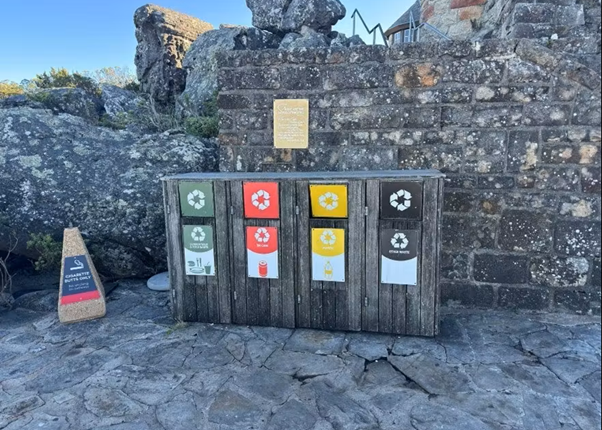
Photo courtesy: Table Mountain Aerial Cableway Company
Across Africa, tourism businesses are stepping up to tackle one of the sector’s biggest environmental challenges: waste. From plastic pollution to food and glass waste, the continent is becoming a hub of innovation, turning waste into resources, jobs and community value.
WTM Africa Responsible Tourism Awards 2025 – Gadget
EVENTS
GITF Guangzhou International Travel Fair 2025
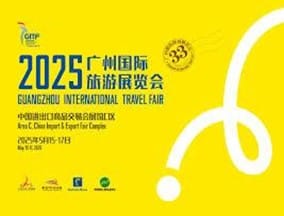
The GITF Guangzhou International Travel Fair 2025 will take place from May 15-17, 2025, in Guangzhou/China.
GITF is the travel fair and conference with the longest tradition in China and the main meeting point for the biggest international tourism source market in the world: South China, including the Greater Bay Area Hong Kong SAR and Macau SAR.
In 2025, the motto of the fair and the accompanying conference is Meaningful Tourism – Enduring Connections. The conference is organized by the Meaningful Tourism Centre. On the first day four keynote speakers from international organisations plus a presentation of the Greater Bay Area Inbound and Outbound Tourism Report done MTC in cooperation with Hong Kong Polytechnical University, Sun Yat-sen University Guangzhou and Macau University of Science and Technology will provide concentrated updates and insights. On the following two days several shorter focus satellite events will focus on several hot topics in Chinas outbound tourism including Meaningful Tourism in China.
The 19th UN Tourism Asia-Pacific Executive Training Programme on Tourism Policy and Strategy
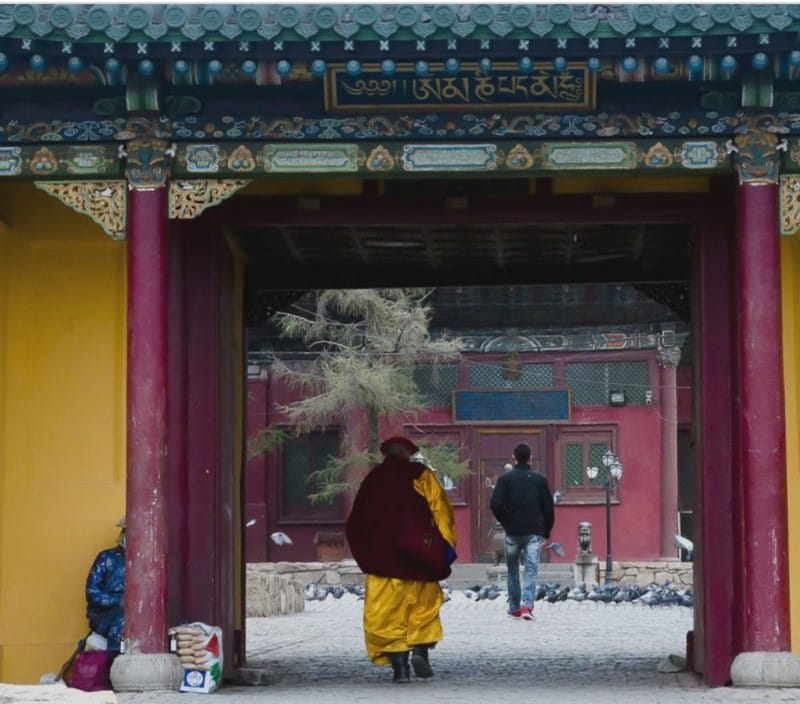
The 19th UN Tourism Asia-Pacific Executive Training Programme on Tourism Policy and Strategy organized by UN Tourism will be held in Ulaanbaatar, Mongolia from 19 – 22 May 2025.
Learn more on the official UN Tourism website →
Meaningful Tourism Weekly is published every Thursday by the MTC Meaningful Tourism Centre (London and Kathmandu).
Each Meaningful Tourism Weekly includes the Meaningful Tourism Weekly Editorial, news about MTC activities, a Best Practice example, a portrait of a MTC-certified trainer, news about upcoming events and occasionally additional op-ed pieces provided by guest authors.
Furthermore, carefully selected news items including videos and podcasts with a link to the original source are added, sorted according to the six main stakeholders of tourism and hospitality, as defined by the Meaningful Tourism paradigm: Traveller/Guests, Host community, employees in tourism and hospitality service providers, service providing companies, governments and the environment.
Subscription to Meaningful Tourism Weekly is free, there are no advertisements. Names and other details of the subscribers are not shared with anybody.
Sponsorship options are available.
If you are interested in the work of the Meaningful Tourism Centre, providing trainings, market research, product adaptation, consulting services, conferences, strategy development and marketing, visit our website www.meaningfultourismcentre.org or contact us using info@meaningfultourismcentre.org.
© 2025 Meaningful Tourism Centre Ltd. (London & Kathmandu). Texts and information can be used in other online and offline publications if the source “Meaningful Tourism Weekly” is mentioned
PARTNERS

